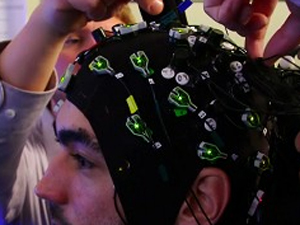



Date:09/03/16
 Researchers from HRL Laboratories, based in California, say they have found a way to amplify learning, only on a much smaller scale than seen in the Hollywood film. They studied the electric signals in the brain of a trained pilot and then fed the data into novice subjects as they learned to pilot an aeroplane in a realistic flight simulator.
Researchers from HRL Laboratories, based in California, say they have found a way to amplify learning, only on a much smaller scale than seen in the Hollywood film. They studied the electric signals in the brain of a trained pilot and then fed the data into novice subjects as they learned to pilot an aeroplane in a realistic flight simulator.
The study, published in the journal Frontiers in Human Neuroscience, found that subjects who received brain stimulation via electrode-embedded head caps improved their piloting abilities and learnt the task 33 per cent better than a placebo group.
Our system is one of the first of its kind. It’s a brain stimulation system,” explained Dr Matthew Phillips. “It sounds kind of sci-fi, but there’s large scientific basis for the development of our system. “The specific task we were looking at was piloting an aircraft, which requires a synergy of both cognitive and motor performance.
“When you learn something, your brain physically changes. Connections are made and strengthened in a process called neuro-plasticity. “It turns out that certain functions of the brain, like speech and memory, are located in very specific regions of the brain, about the size of your pinky.”
Dr Matthews believes that brain stimulation could eventually be implemented for tasks like learning to drive, exam preparation and language learning. “What our system does is it actually targets those changes to specific regions of the brain as you learn,” he added.
Scientists discover how to ‘upload knowledge to your brain’
 Researchers from HRL Laboratories, based in California, say they have found a way to amplify learning, only on a much smaller scale than seen in the Hollywood film. They studied the electric signals in the brain of a trained pilot and then fed the data into novice subjects as they learned to pilot an aeroplane in a realistic flight simulator.
Researchers from HRL Laboratories, based in California, say they have found a way to amplify learning, only on a much smaller scale than seen in the Hollywood film. They studied the electric signals in the brain of a trained pilot and then fed the data into novice subjects as they learned to pilot an aeroplane in a realistic flight simulator.The study, published in the journal Frontiers in Human Neuroscience, found that subjects who received brain stimulation via electrode-embedded head caps improved their piloting abilities and learnt the task 33 per cent better than a placebo group.
Our system is one of the first of its kind. It’s a brain stimulation system,” explained Dr Matthew Phillips. “It sounds kind of sci-fi, but there’s large scientific basis for the development of our system. “The specific task we were looking at was piloting an aircraft, which requires a synergy of both cognitive and motor performance.
“When you learn something, your brain physically changes. Connections are made and strengthened in a process called neuro-plasticity. “It turns out that certain functions of the brain, like speech and memory, are located in very specific regions of the brain, about the size of your pinky.”
Dr Matthews believes that brain stimulation could eventually be implemented for tasks like learning to drive, exam preparation and language learning. “What our system does is it actually targets those changes to specific regions of the brain as you learn,” he added.
Views: 624
©ictnews.az. All rights reserved.Similar news
- The mobile sector continues its lead
- Facebook counted 600 million active users
- Cell phone testing laboratory is planned to be built in Azerbaijan
- Tablets and riders outfitted quickly with 3G/4G modems
- The number of digital TV channels will double to 24 units
- Tax proposal in China gets massive online feedback
- Malaysia to implement biometric system at all entry points
- Korea to build Green Technology Centre
- Cisco Poised to Help China Keep an Eye on Its Citizens
- 3G speed in Azerbaijan is higher than in UK
- Government of Canada Announces Investment in Green Innovation for Canada
- Electric cars in Azerbaijan
- Dominican Republic Govt Issues Cashless Benefits
- Spain raises €1.65bn from spectrum auction
- Camden Council boosts mobile security





















